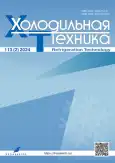Development of an energy efficient no-bleed environmental control system for aircraft with distributed power plant
- Authors: Tishchenko I.V.1,2, Abalakin S.A.1, Gornovskii A.S.1, Gubernatorov K.N.3
-
Affiliations:
- Public Joint Stock Company NPO «Nauka»
- Bauman Moscow State Technical University
- Federal Autonomous Institution «GosNIIAS»
- Issue: Vol 113, No 2 (2024)
- Pages: 97-105
- Section: Original Study Articles
- URL: https://freezetech.ru/0023-124X/article/view/636714
- DOI: https://doi.org/10.17816/RF636714
- EDN: https://elibrary.ru/ITDEQM
- ID: 636714
Cite item
Abstract
Background: Today, there are high fuel efficiency requirements to state-of-the-art passenger aircraft. The environmental control system (ECS), a one on general aircraft systems, shall have high energy efficiency to ensure the overall fuel efficiency of the aircraft, including by integrating compressed air sources and electric air cycle machines in the ECS.
Aim: To estimate the performance of the circuit solution created during research and development (R&D) of the energy-efficient electric ECS of an aircraft.
Materials and methods: We developed a static mathematical model of an electric ECS with moisture content control to determine system parameters in various operating modes.
Results: The article presents specifications of the electric turbo compressor (ETC) as a key unit of the studied electric ECS and the calculation of ECS parameters for different operating modes.
Conclusion: The article presents conclusions on the operability of the proposed design of an energy-efficient ECS with an ETC for a regional distributed propulsion aircraft, the achieved level of readiness of the ECS technology, the need for research and development of ETC and ETC-based ECS pack.
Full Text
About the authors
Igor V. Tishchenko
Public Joint Stock Company NPO «Nauka»; Bauman Moscow State Technical University
Author for correspondence.
Email: iv.tishchenko@npo-nauka.ru
ORCID iD: 0000-0001-6094-8723
SPIN-code: 5630-4301
Cand. Sci (Engineering)
Russian Federation, Moscow; MoscowSergey A. Abalakin
Public Joint Stock Company NPO «Nauka»
Email: sa.abalakin@npo-nauka.ru
ORCID iD: 0009-0001-9193-1147
SPIN-code: 7580-9545
Russian Federation, Moscow
Artem S. Gornovskii
Public Joint Stock Company NPO «Nauka»
Email: as.gornovskiy@npo-nauka.ru
ORCID iD: 0000-0003-2676-3463
SPIN-code: 8087-8959
Russian Federation, Moscow
Konstantin N. Gubernatorov
Federal Autonomous Institution «GosNIIAS»
Email: guber47@yandex.ru
ORCID iD: 0009-0007-4795-5655
SPIN-code: 5063-7716
Russian Federation, Moscow
References
- Kalenskiy SM, Morzeeva TA, Ezrokhi YuA. The application of the variable pitch fan blades in the distributed powerplant for advance long-range aircraft for matching takeoff and cruise. Aviation engines. 2019;3:49–56. (In Russ.)
- Smagin DI, Starostin KI, Savel’ev RS, et al. Analysis of competing variants of air conditioning systems without air extraction from engines at the stage of passenger aircraft onboard systems conceptual design. Computational nanotechnology. 2019;6(3):86–91. (In Russ.) doi: 10.33693/2313-223X-2019-6-3-86-91
- D’yachenko YuV, Sparin VA, Chichindaev AV. Aircraft life support systems. Novosibirsk: NGTU; 2019. (In Russ.)
- Kalliopin AK, Savel’ev RS, Smagin DI. Main trends in designing air conditioning systems for future-technology vehicles. Engineering magazine: science & innovations. 2017;(6). doi: 10.18698/2308-6033-2017-6-1627
- Cronin MJ. Design aspect of systems in all electric aircraft. SAE Technical Papers Series. 1982;821436.
- Voronovich S, Kargapol’tsev V, Kutakhov V. All-electric aircraft. Aviapanorama. 2009;2:23–27.
- Nelson T. B787 systems and performance. Boeing; 2005.
- Liebherr-Aerospace, Germany, Liebherr-International Deutschland GmbH. 2016. Accessed: 07.10.2024. Available from: https://www.liebherr.com/shared/media/aerospace-and-transportation/aerospace/downloads/magazines/aets-magazines-recent/liebherr-aerospace-magazine-2016-en.pdf
Supplementary files












